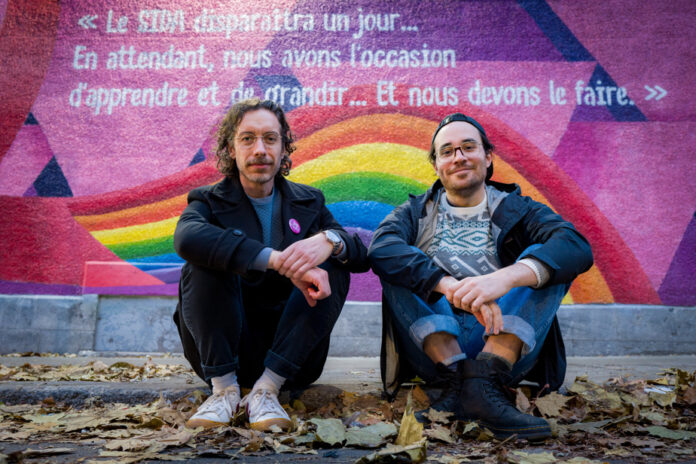A theatrical adaptation of the novel by Swede Jonas Gardell, Never Wipe Tears Without Gloves is a show-event. A story of love, friendship and solidarity, the play tells the story of the ravages of the AIDS virus among a group of friends in Sweden in the 1980s and 1990s. Discussion around a forgotten pandemic.
Alexandre Fecteau: Because we have not yet explored the subject, with hindsight and perspective in relation to the epidemic, as Jonas Gardell did. AIDS is a tragedy that has not had its epilogue. During performances at the Grand Théâtre in Quebec, I listened to the spectators’ conversations during intermission. I realized that people turned the page too quickly. They were unable to verbalize their pain and recount the memories of friends who died in their early twenties. I understand them. From the day we stopped dying of AIDS, it was a miracle for the sick, even if their situation was not perfect.
Alexandre Fecteau: We can summarize it like this. I had this intuition when launching the project in 2018. Then when it was created, in the spring, I had confirmation: the subject resonates strongly in 2023.
Olivier Arteau: Indeed, I have never seen so many people cry in the theater. We touch on very intimate legacies. The spectators abandon themselves, recognize themselves. The novel [at over 800 pages] remains a difficult read to do on its own. Adapting it to the theater makes it possible to create a collective experience, a communion, for older spectators who have lost loved ones. All these deaths were not in vain.
Alexandre Fecteau: I have the impression that the injustice, the shame, the rejection of victims never stops… even after their death. When the COVID-19 pandemic appeared, my motivation to put on this show increased. I was angry ! In retrospect, when we look at all the means used to protect the population in the world, compared to what we did for the victims of AIDS, it is quite distressing.
Alexandre Fecteau: Completely! To me, that says a lot about how society treats its minorities. When a virus kills gay men, prostitutes, drug addicts, the world may well continue to turn.
Olivier Arteau: What shocks me is the extent to which my generation [the Y] takes the battles of the past for granted. Since the arrival of PrEP [preventive treatment against infection by the AIDS virus], we believe that our sexual freedom has never been threatened. As if the disease had never existed. Sex education has not kept up with scientific advances.
Alexandre Fecteau: This generation was born with these gains, forgetting the fight waged in the past to achieve them. And also to what extent these achievements remain fragile, because we are never safe from a step backwards, from a reversal. Look at what is happening in the United States with abortion rights. I just adopted a baby with my boyfriend. I look back with emotion on the journey taken to enable same-sex parenthood; the struggles carried out so that I could benefit from them. If I had been born 30 years earlier, I don’t think I would have wanted to start a family at all costs. However, starting a family is part of me.
Alexandre Fecteau: It’s true that coming out is still as difficult individually, despite social progress. I think that, deep down, there remains this impression of not being a “real” man, a “real” woman. To be a failure, a failure, a disappointment.
Olivier Arteau: The notion of coming out bothers me. This term should not exist. Or be replaced by the right to indifference. While playing Trident, I realized that this isn’t a show about gay activism and AIDS. It’s a play about “human solidarity.” Activism is not just about our own causes. We live in a society of silos: we defend what concerns us personally, for fear of not having the legitimacy to speak about causes outside of ourselves. I marched for trans rights in Quebec. I find it important to support this cause. All minority struggles are important. I hope the show will wake people up to the injustices faced by various groups. We must not rank oppressions.





